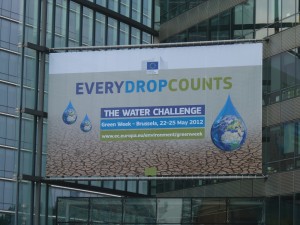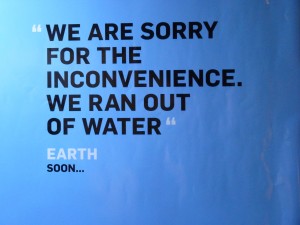Search Results for Tag: water
Climate adaptation or building resilience (and does it matter?)
Four weeks away from the Rio Summit, the impression I’ve been getting here at Green Week in Brussels has not been one of great optimism on the part of the EU experts involved in the preparations. The EU says it’s going for ambitious targets, but has no reason to assume that others are going to follow suit. EU Director General for environment Karl Falkenberg say’s next week’s meeting in New York for the last round of pre-Rio negotiations will be an “uphill challenge”. The Danish Environment Minister Ida Auken (Denmark currently has EU Presidency) wants to have a global goal on water. We need to take all 3 aspects of sustainability into account, says Auken. The social, environmental and economic impacts. Yes, yes, yes!. Let’s see what will actually come out of Rio.
![]() read more
read more
Earth – Closed for shortage of water?
I’m in Brussels at the moment for the EU’s annual environment policy conference, the Green Week. Every Drop Counts: Water is the focus this year, in keeping with 2012 as International Water Year and in the run-up to the earth summit in Rio in June. Once again the message is that water is involved in or affected by just about all our human activities. So protecting our water supplies has to be a part of policies on agriculture, energy or urbanisation. And it has to be tackled globally. And as consumers of products that have a huge water footprint, we consumers have a role to play. Everybody is calling for a networked approach, looking at the nexus of water, energy, food security. This is a recurrent theme at environment gatherings I’ve attended over the past year. Is this thinking finding its way into policy and practice, I wonder?
A growing population and rapid climate change are putting our water supplies under huge pressure. One speaker said that as early as 2030 the world’s demand for freshwater will exceed supply by around 40% and 50% of the world’s population will live in regions with water shortages. Shocking? More later between sessions.
And if you’re interested in the organisation whose water shortage poster at the stand is on the photo, you’ll find it at formatoverde Their business is education for sustainability. The link is to the English website.
On the banks of the blue Danube
It has been a busy few days in Budapest.I have posted some more about my stay here on the Global Ideas Blog, which is all about smart ideas for tackling climate change.
Forgive me if I direct you straight there for now. This trip is all about saving resources and sharing, so some thoughts on the Blue Danube are there.
More soon.
Climate networking in Budapest

I am in Budapest, the capital of Hungary, which currently holds the EU Presidency. An attractive city, these give a brief impression, taken during my coffee break.

The European Journalism Centre on behalf of the European Commission is holding a conference for journalists here. Today we were focusing on energy and climate and in particular the EU’s new road map for “moving to a competitive low-carbon economy in 2050″, which was released last week.
It’s really interesting to meet and network here with so many journalists from eastern and central European countries and to hear their different perspectives on climate change and communicating it. Both informally on the sidelines and during the sessions, the huge differences in living standards and finances between some countries become available. One colleague said it was impossible to persuade poor farmers or other rural residents in Roumania to invest in insulating their houses to make them more “climate friendly“ when they didn’t even have the money to buy fuel to heat their homes in the first place.
So when it comes to the EU’s proposed road map for reducing fuel consumption, clearly the views in different regions are going to be very different. So are the media and attitudes towards environmental issues in general.
Artur Runge-Metzger is the Director of the DG Climate Action for the European Commission. He presented the new plan, which he stresses is in no way binding, but designed to provoke debate.

It sets out ways key economic sectors could achieve an overall 80% reduction in the EU’s emissions by 2050 (compared to 1990). The member states will be discussing and evaluating it between now and June.It will also be interesting to see how different industries and businesses react. The positive thing is, I find, it stresses that it is possible to be competitive while still reducing emissions (admittedly using some technologies not everybody would accept as safe and clean, more later)
WWF’s Director of Global Energy Stephan Singer is also here. He welcomed the road map as a good start but (as you might expect) said it was “too timid”. He sees it as positive that the EU has come out with a document like this at all and that it focuses on domestic measures to reduce emissions.
The EU’s figures of course include nuclear and were published just before the Japanese reactor accidents. I had to ask the question of how the disaster is affecting the EU’s approach. At fist Mr Runge-Metzger was reluctant to answer, saying the Commission respects the member states’ individual policies on this. But later he told me of course the accident was putting a new spotlight on nuclear and might well influence some countries to change their minds. It clearly changes the situation.
In a talk with my colleague Pavel Antonov, a Bulgarian journalist now researching into climate change and the media, he drew my attention to a comment in the Guardian by George Monbiot. I was flabbergasted when I read it. He has changed tack and says he is now for nuclear because the side-effects of the disaster have not been too bad, considering. I find that unbelievable and I think it is too early to come out with that. Or are you just trying to provoke us George? The latest press release I just received from Greenpeace expresses deep concern about the radioactive contamination of Tokyo’s drinking water and the official information policy surrounding the accident. These are very difficult times all round. More tomorrow. Tonight we have a discussion on covering climate change in the media and differences in different media, different countries, etc.
Melting glaciers causing major problems in Peru
There is an interesting – if worrying – story on the Global Ideas website about the rapid melting of the country’s glaciers and problems being caused by climate change. Peru is regarded as being highly vulnerable to climate change.






















Feedback